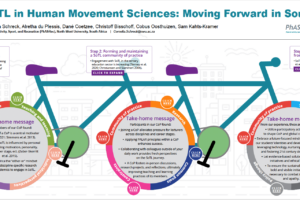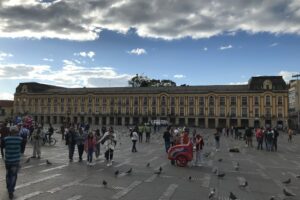Student Presence at ISSOTL – at the Conference and on the Board
Dear Colleagues,
It’s fall, and emails about the upcoming ISSOTL conference in Bergen are starting to arrive in my inbox, kind diversions from the dissertation and the job search. Serving on the Board for four years and working alongside some amazing people, particularly the Student Representatives with whom I served, Roselynn Verwoord and Sam Lucie Dvorakova, I realized how much goes into the student presence at ISSOTL. I’m writing to invite you to consider how you can contribute to that student presence, particularly as you prepare for this year’s conference.
In my experience, conference time is when we think about who stands for election. Because student members are highly visible at conference time—they deliver presentations and posters, sit in on committee and SIG meetings, and occasionally make announcements from the main podium—it is natural to consider who we seek for nomination at that time. Identifying Student Representative nominees from among those present at and involved in this year’s conference is a sensible approach.
I believe all Student Representatives, past and present, would tell you that it takes more than faculty members’ encouragement to succeed as a Student Representative now: it takes ongoing partnership. Students considering a run for Student Representative need faculty who will offer them opportunities to develop administrative skills and interpersonal acumen ahead of time—often these are used via email and other telecommunications—and who will provide support as they write election materials. If they are elected, they may need a mentor as they navigate ISSOTL’s organizational dynamics, which are often more complex than those on our campuses because they are multinational (and, depending on where you live, require your attention at odd hours of the day or night).
After the May election, Student Representatives enter an intensive period of conference preparation during which they set and communicate deadlines for the Emerging Scholars Fund and the Student Presentation and Poster Awards, receive applications for those two initiatives, work with the Students & SoTL Committee to adjudicate the ESF bursaries, arrange judges for the student awards, and prepare the conference’s Student Welcome Event—all while remaining active contributors at monthly Board meetings. Student Representatives have a much more active role at ISSOTL than they did when Roselynn and I first joined the board in 2014.
On the 2018 ballot we had the largest number of nominees for a Student Representative position we’ve ever seen, and I hope that trend continues. This year, I’d encourage you to think beyond the 2019 ballot and consider what will enhance the 2020 ballot. And that thinking might better be focused not on who’s visible at this year’s conference, but on who’s not. Who have you met that might really enjoy working with your ISSOTL committee, or contributing to your SoTL research project? Who is saying smart, interesting things, even if they’re not saying them in a presentation? Who is obviously listening intently to what’s going on in your committee or SIG meeting? And most importantly, who, from your home institution, should be there, but isn’t? How do we get those students involved, and how do we create opportunities for them to hone their skills and develop confidence, so that they need very little encouragement to run for Student Representative in two years? Perhaps all of these are versions of a question we always seem to be asking: how do we build an ISSOTL that is more itself?
For the first time since 2012, I will not be with you all at the conference, and I’ll miss the keynotes and presentations, and our conversations. Dissertation committee and job market permitting, I’ll see you again in 2019. Many thanks to all of you who have offered encouragement and support these past four years; it would have been impossible without you.
Gratefully,
Aaron Long
Ph.D. Candidate, English Department
The University of Kansas
Aaron.Long@KU.edu
@PhDEnglish




